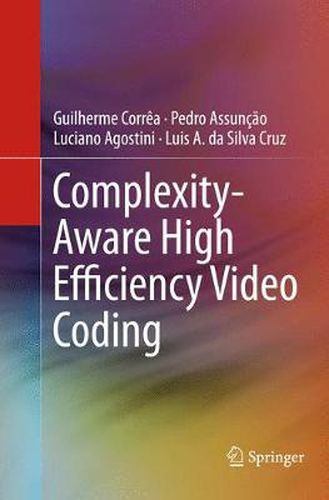Readings Newsletter
Become a Readings Member to make your shopping experience even easier.
Sign in or sign up for free!
You’re not far away from qualifying for FREE standard shipping within Australia
You’ve qualified for FREE standard shipping within Australia
The cart is loading…






This title is printed to order. This book may have been self-published. If so, we cannot guarantee the quality of the content. In the main most books will have gone through the editing process however some may not. We therefore suggest that you be aware of this before ordering this book. If in doubt check either the author or publisher’s details as we are unable to accept any returns unless they are faulty. Please contact us if you have any questions.
This book discusses computational complexity of High Efficiency Video Coding (HEVC) encoders with coverage extending from the analysis of HEVC compression efficiency and computational complexity to the reduction and scaling of its encoding complexity. After an introduction to the topic and a review of the state-of-the-art research in the field, the authors provide a detailed analysis of the HEVC encoding tools compression efficiency and computational complexity. Readers will benefit from a set of algorithms for scaling the computational complexity of HEVC encoders, all of which take advantage from the flexibility of the frame partitioning structures allowed by the standard. The authors also provide a set of early termination methods based on data mining and machine learning techniques, which are able to reduce the computational complexity required to find the best frame partitioning structures. The applicability of the proposed methods is finally exemplified with an encoding time control system that employs the best complexity reduction and scaling methods presented throughout the book. The methods presented in this book are especially useful in power-constrained, portable multimedia devices to reduce energy consumption and to extend battery life. They can also be applied to portable and non-portable multimedia devices operating in real time with limited computational resources.
$9.00 standard shipping within Australia
FREE standard shipping within Australia for orders over $100.00
Express & International shipping calculated at checkout
This title is printed to order. This book may have been self-published. If so, we cannot guarantee the quality of the content. In the main most books will have gone through the editing process however some may not. We therefore suggest that you be aware of this before ordering this book. If in doubt check either the author or publisher’s details as we are unable to accept any returns unless they are faulty. Please contact us if you have any questions.
This book discusses computational complexity of High Efficiency Video Coding (HEVC) encoders with coverage extending from the analysis of HEVC compression efficiency and computational complexity to the reduction and scaling of its encoding complexity. After an introduction to the topic and a review of the state-of-the-art research in the field, the authors provide a detailed analysis of the HEVC encoding tools compression efficiency and computational complexity. Readers will benefit from a set of algorithms for scaling the computational complexity of HEVC encoders, all of which take advantage from the flexibility of the frame partitioning structures allowed by the standard. The authors also provide a set of early termination methods based on data mining and machine learning techniques, which are able to reduce the computational complexity required to find the best frame partitioning structures. The applicability of the proposed methods is finally exemplified with an encoding time control system that employs the best complexity reduction and scaling methods presented throughout the book. The methods presented in this book are especially useful in power-constrained, portable multimedia devices to reduce energy consumption and to extend battery life. They can also be applied to portable and non-portable multimedia devices operating in real time with limited computational resources.